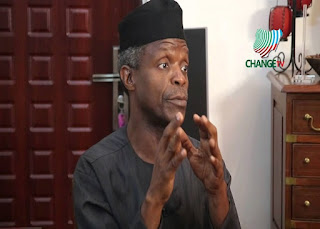Anti-Religious Bill unconstitutional - Osinbajo
The Vice-President, Prof Yemi Osinbajo, has said any attempt to
restrict freedom of worship would amount to unlawful conduct. Osinbajo
declared that prior restraint to religious worship in the country was
open to abuse.
The Vice-President stated this on Monday at the first National Judicial Round-table in Abuja.
Osinbajo, who spoke as Special Guest of Honour at the maiden event at
the National Judicial Institute in Abuja, noted that the freedom of
speech and worship were closely linked and inseparable.
He delivered his address on the theme of the one day conference
tagged: ‘The Intersection between Law and Religion: World
Perspectives’.
“I am of the view that prior restraint to freedom of worship is open
to abuse and will unduly restrict freedom of worship and it’s probably
unconstitutional. Freedom of speech is not only a fundamental right in
its own right but it is also the vehicle for the realisation of other
rights.”
The VP addressed a gathering of top judicial officers, academics and
religious leaders as well as international dignitaries who converged on
Abuja from all over the country.
Osinbajo, however, pointed out that multi-religious and multi-ethnic
societies must accept the arbitration of law and its religiously neutral
institutions for the maintenance of peaceful co-existence.
“A secular state where freedom of religion is allowed and rigorously protected is fundamental to an orderly society.
“Law and religion must protect the fundamental and inalienable rights
of every person to life in all its social and political implications.
The laws must, however, be enforced to punish offensive conducts such
as the dissemination of hate speech or the perpetration of unlawful
acts under the guise of religious beliefs”, Osinbajo declared.
The Vice-President who is a professor of Law and a Pastor, “There is no
question at all that there are important intersections between Law as
an instrument of social control and religion, especially in so far as
it tends to define moral parameters and borders.
He submitted that most legal systems draw substance from formal
religious systems, adding that despite these obvious intersections
between law and religion, both systems have their own sources and
structures of authority.







Post a Comment